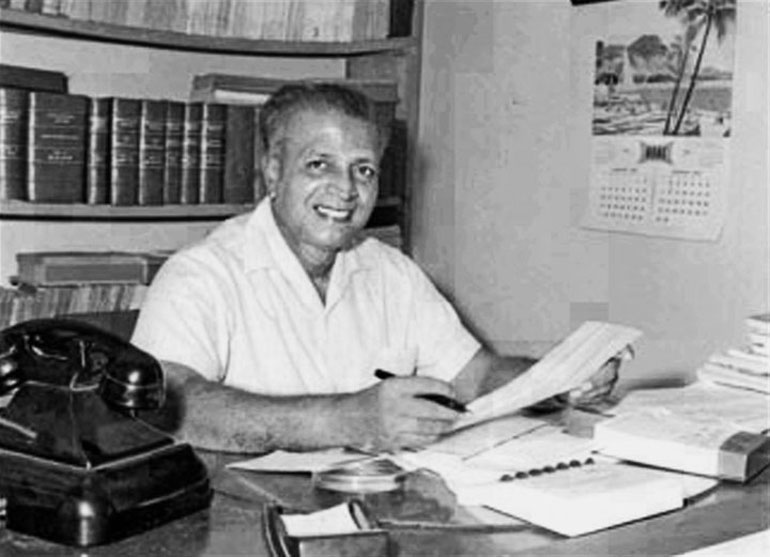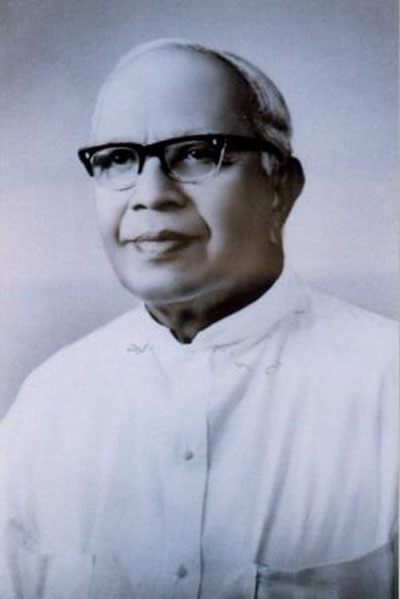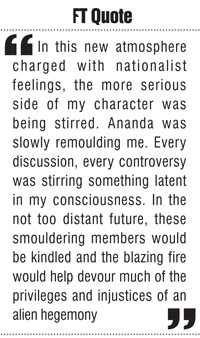Tuesday Mar 03, 2026
Tuesday Mar 03, 2026
Saturday, 13 June 2015 00:00 - - {{hitsCtrl.values.hits}}

Dr. N.M. Perera

P. de S. Kularatne
Continuing his story on his school-going days (early days appeared last Saturday), Dr. N.M. Perera says the sudden switch from a missionary institution (S. Thomas’) to a national institution (Ananda) marked an important watershed in his life. He elaborates on what he calls the significant change he experienced.
“Under the dynamic leadership of P. de S. Kularatne, Ananda was becoming the premier Buddhist educational establishment of the country. More than that, it was in the forefront of education. It outshone other colleges in the results in achieved in public examinations. An outstanding staff gave it a pre-eminence which attracted the best talents of the student population. Apart from Mr. Kularatne himself, we had such teachers like G. Weeramantry, T.B. Jayah, G.P. Malalasekera, C. Suntheralinhgam, C.S. Strange, C.V. Ranawaka, William Perera, J.N. Jinendradasa, L.H. Mettananada, G.C. Edirisinghe, etc.

Buddhist revival coupled with nationalism
“Furthermore, this was the period of Buddhist revival coupled with nationalism. Mr. Kularatne himself had led the way by donning the national dress and discarding the coat and trousers as foreign to our cultural heritage. Doubtless, the ferment in India under the leadership of Mahatma Gandhi, Motilal Nehru, Sapru Malaviya and C.R. Das fired the imagination of an institution like Ananda. It is no accident that Ananda at this time sponsored distinguished guest speakers such as Mrs. Sarojini Naidu and Dr. Evans Wentz. While Mrs. Sarojini Naidu kindled our national aspirations, Dr. Evana Werntz stimulated the Buddhist revival. These were but two facets of the single objective of national regeneration. National independence was a sine qua non for Buddhism to regain its rightful place in the country. This trend of thought got additional stimulus from an address by Mrs. Annie Besant.”
Dr. N.M. sums up that he was thus “catapulted from a carefree world of sport and an alien atmosphere to a new world of intense nationalism”. He recalls that in his last year at S. Thomas’, he was “smoothly being inveigled into becoming a Christian as a result of some slick work on the part of Rev. G.B. Ekanayake”. He admits he was rescued just in time by the vigilance of his parents who “gently whisked me away from that atmosphere”.
Blossoming out as a leader
While cricket continued to be young NM’s first love, he did not neglect his studies and remembers clearing both Junior and Senior Cambridge examinations without much effort. He found Ananda had jettisoned Latin and Greek, the “dead languages” and he got “propelled into more exciting studies like history and geography”.
He admits that at Amanda he was blossoming out as a leader of the students. He was a member of the first eleven cricket team (he captained in his final year – 1925), active in the debating societies, and was chosen by the principal for responsible jobs, particularly in fundraising projects. “He (Principal) felt he could depend on me to do my work without fear and favour,” he says.
At Ananda, he also grasped the true meaning of Buddhism. “Hitherto, it has been just ritual, going to temples with members of the family, reciting ‘gathas’ and lighting the lamps. Now, for the first time under the guidance of great teachers like Rev. Ananada Maitriya, Buddhist philosophy broadened my humanism. The reality of the doctrines began to penetrate the innermost recesses of my thinking. It was natural, therefore, that I observed ‘ata sil’ on most Poya days while at Ananda,” he reminisces.
Slowly remoulded at Ananda
“Herein lay the great divide. Missionary education was both apolitical and anti-national, not specifically, but insidiously so. An institution like Ananda had a different tone and a different atmosphere. At Ananda, one felt the impact of everything that was happening in the country, to the people of the country. At an institution like S. Thomas’, one felt aloof and immune from the hurly burly of everyday life. I believe this was typical of most missionary schools that functioned during this time.
“In this new atmosphere charged with nationalist feelings, the more serious side of my character was being stirred. Ananda was slowly remoulding me. Every discussion, every controversy was stirring something latent in my consciousness. In the not too distant future, these smouldering members would be kindled and the blazing fire would help devour much of the privileges and injustices of an alien hegemony.”
He left Ananda in 1925, entered the university – first University College, Colombo and then the London School of Economics, got his BSc (Honours) degree from the University of London (1929) followed by the Ph.D (1933) and submitted the work for D.Sc. before returning to Sri Lanka.